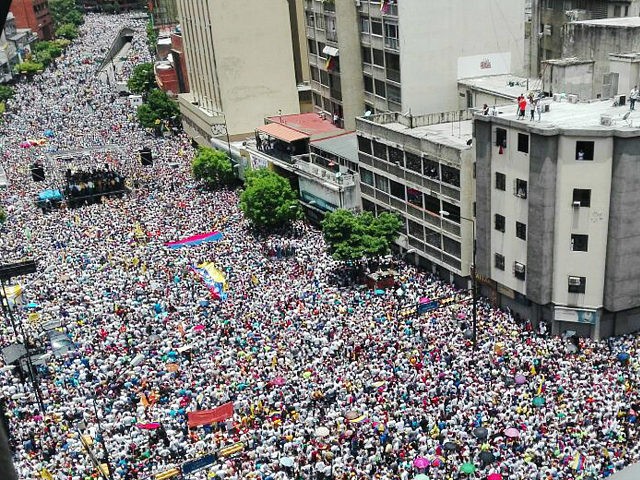Faced with what the opposition is calling, “the largest mobilization of people in the political history of Venezuela,” the nation’s socialist government is using violent police tactics, roving Chavista gangs, and “secret police” arrests of prominent dissidents to attempt to silence dissent.
On Thursday, the opposition organized a protest in the nation’s capital dubbed, “the Caracas Takeover,” attracting between 950,000 and 1.1 million people, according to organizers. The Venezuelan government claims a paltry 30,000, a claim images of the protest make difficult to believe. The Caracas Takeover was a collection of largely peaceful protesters, seen in videos chanting slogans like “Venezuela is hungry” and singing the national anthem on social media.
“We either come out to march or we will die of hunger. We are no longer afraid of the government,” Ana Gonzalez, a protester, told AFP. Due to socialist mismanagement and strict import controls, Venezuela is on the verge of a famine, with most supermarkets severely understocked and up to 90 percent of families unable to secure food for their children on a regular basis.
Thousands of people singing the national anthem in Caracas, the world needs to watch this #1SeptReclamoDeLibertad pic.twitter.com/IrmHFnSrNE
— em (@poemirwin) September 1, 2016
As the sun set, opposition members called on protesters to stage a “cacerolazo,” a peaceful protest common in Latin America in which protesters bang pots and pans to make a noise loud enough to keep the president from sleeping. That protest was also largely successful, according to observers on social media.
NO es Altamira,es 23 de Enero!Mcpio LIBERTADOR!Ay Maduro y su perturbado!Van pafuera! #CacerolazoPorRevocatorio pic.twitter.com/WHo1UY8MLN
— Henrique Capriles R. (@hcapriles) September 2, 2016
The #1S cacerolazo going on at the moment is pretty loud in this part of Caracas… pic.twitter.com/fT0RuM1xZF
— Nathan Crooks (@nmcrooks) September 2, 2016
The government began to use police force to crack down on the protest at least a day in advance. The Bolivarian National Guard rounded up international journalists it could not trust to be favorable to President Nicolás Maduro — including reporters from Al Jazeera, Le Monde, The Miami Herald, and the Committee to Protect Journalists — and accused them of violating immigration laws, deporting them immediately.
To prevent the crowds from getting too big, police began barricading the major roads connecting Caracas to the rest of Venezuela. While the traffic jams prevented few from entering the city — many left their cars and walked — some were stuck on large buses. Reports and video from the outskirts of Caracas show colectivos, armed Chavista gangs the government uses to threaten the opposition, hurling stones at the buses and attacking protesters before they could get to Caracas.
Reportan que tupamaros y colectivos atacaron los autobuses. Hirieron a uno de nuestros compañeros. via Mary Menuto pic.twitter.com/O4NbQaaWmn
— Hecmiry Lugo (@hecmirylugo) September 1, 2016
Lo que está sucediendo en La Victoria 11.40am #TomamosCaracas #1S ¡Colectivos atacando! No hay paso a Ccs pic.twitter.com/oCmMD75V5G
— Adyss de Escalona (@AdyssGU) September 1, 2016
Colectivos were also present in Caracas, where video shows them approaching the protesting crowds and hurling rocks and shooting at them. Protesters were unarmed, as owning private firearms is illegal in Venezuela.
Colectivos están en las calles causando terror. Esto ocurrió en Maracay, #Venezuela pic.twitter.com/qv0tX6S4TU
— Yusnaby Pérez (@Yusnaby) September 1, 2016
#1sept Situación difícil entre manifestantes y GNB en Las Mercedes #Caracas. Salieron los Colectivos. RT pic.twitter.com/sS8WFbO3Nl
— Místerpopo celestial (@antenax2) September 1, 2016
In addition to the informal gangs, members of the Bolivarian National Police attacked protesters. At least one video shows them approaching unarmed protesters, dragging a woman by the hair over a highway guardrail, slamming her head on the ground.
On Friday, the police continued harassing opposition members, with the nation’s secret police (Sebin) arresting the mayor of Mario Briceño Iragorry, Delson Guarate. He is not being held on any charges as of press time. The Argentine news outlet Infobae notes that two other opposition mayors — Orlando Hernández of Mellado and Pedro Loreto of Leonardo Infante — were detained on Thursday night under similar circumstances.
Government spokeswoman Delcy Rodríguez, who also serves as foreign minister, praised police abuses of protesters during a discussion with international reporters on Friday. “Thanks to the coordinated actions of Venezuela’s law enforcement bodies, a violent plan prepared for yesterday was thwarted,” she asserted. “The preventative actions of the national government prevented a massacre.” She did not elaborate on this claim.
Maduro’s government held a counter-protest on Thursday they claim was bigger, though photos seem to indicate paltry attendance. Diosdado Cabello, the Socialist Party’s (PSUV) minority leader in the legislature, tweeted a photo of a rally during the tenure of late dictator Hugo Chávez, claiming it was a photo of the streets of Caracas on Thursday. Maduro himself, meanwhile, delivered a speech at his personal rally declaring, “the coup has been defeated.” He left unclear what coup he was referring to or how the government had “defeated” it. Opposition website Dolar Today described the speech as a “global ridicule” for the head of state.

COMMENTS
Please let us know if you're having issues with commenting.